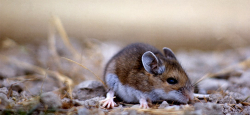Local public health agencies confirm case of Hantavirus
A recent confirmed case of Hantavirus pulmonary syndrome (HPS), a rodent-spread disease, in a Deschutes County resident has prompted local health officials to remind residents to take precautions to prevent exposure to the virus that causes HPS at their places of residence, work and recreation. Although rare in our region, there have been a total of 22 cases confirmed in Oregon since 1993.
Hantaviruses are a group of viruses that may be carried by some rodents, usually the deer mouse or white-footed mouse. Since it is hard to tell if a mouse or a rat carries a hantavirus, it is best to avoid all wild mice and rats and to safely clean up any rodent urine, droppings, or nests in your home. The virus is not spread person-to-person and dogs and cats cannot give people hantavirus infections.
Hantavirus symptoms can begin to appear one to six weeks after exposure to the virus. Symptoms include tiredness, dizziness, fever and chills, muscle aches and headaches, nausea and vomiting, stomach pain, and coughing. More severe symptoms may include shortness of breath or severe difficulty breathing.
Hantavirus exposure usually occurs when breathing in the virus. This can happen when rodent urine and droppings that contain a hantavirus are stirred up into the air. People can also become infected when they touch mouse or rat urine, droppings, or nesting materials that contain the virus and then touch their eyes, nose, or mouth.
Hantavirus Prevention:
There is no vaccine for hantavirus infection. The key to disease prevention is:
- preventing rodent infestations
- properly cleaning and disinfecting areas contaminated by rodent droppings
Keep your home, workplace, cabin or campsite rodent-free. All rodent droppings are potentially harmful. You should:
- block openings that might let rodents in
- store food, water and garbage in containers with tightly fitted lids
- place mousetraps throughout buildings
- keep your yard clean
- stack woodpiles away from buildings
Properly clean and disinfect areas contaminated by rodent droppings by following these steps:
- Wear rubber or plastic gloves. If you are cleaning in a confined space, wear a high-efficiency particulate air (HEPA) filtered respirator.
- Do not sweep or vacuum rodent droppings. This will release particles into the air, which you could then breathe in.
- Spray droppings with a household disinfectant or a mixture of 1 part bleach to 9 parts water. Let the area soak for 10 minutes to make sure any virus within the droppings will be killed.
- Wipe up wet droppings with paper towels or a wet mop if dealing with a large area.
- Wash gloves in disinfectant and hot soapy water before taking them off. Afterwards, wash your hands thoroughly.
- If a wet mop was used to clean the area, use disinfectant and hot soapy water to clean the mop.
Know the symptoms of a hantavirus infection. See your health care provider immediately if they develop.
###
Photo Credit: NPS Photo / John Good
News Release Issued: June 13, 2018

